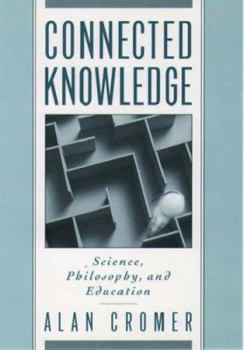Connected Knowledge: Science, Philosophy, and Education
Select Format
Select Condition 
Book Overview
When physicist Alan Sokal recently submitted an article to the postmodernist journal Social Text, the periodical's editors were happy to publish it--for here was a respected scientist offering support for the journal's view that science is a subjective, socially constructed discipline. But as Sokal himself soon revealed in Lingua Franca magazine, the essay was a spectacular hoax--filled with scientific gibberish anyone with a basic knowledge of physics...
Format:Hardcover
Language:English
ISBN:0195102401
ISBN13:9780195102406
Release Date:March 1997
Publisher:Oxford University Press, USA
Length:240 Pages
Weight:1.16 lbs.
Dimensions:0.8" x 6.4" x 9.6"
Customer Reviews
3 ratings
Read this book!
Published by Thriftbooks.com User , 25 years ago
Cromer has it exactly right. Education, along with much of the rest of our culture, has fallen into the hands of know nothings unable to solve the simplest arithmetic problem or explain the difference between astronomy and astrology. No wonder there are so many of them. Over half of US math and science teachers are not certified in those fields, and even more haven't taken a single college course in them.Throughout the book Cromer takes on a number of deserving targets: (1)the standards movement - easy to write, impossible to implement; (2)constructivism and process learning; (3)content free learning; (4)social sciences & statistics (ever wonder why social scientists and educationists offer their own statistics courses?); (5)and so on.Traditional education may have ill-served some of us, but what's being offered in its place is bad for all of us. We're being divided into educational haves and have nots, with the great majority of "average" studen! ts falling increasingly onto the side of ignorance.
Good, provocative, informed
Published by Thriftbooks.com User , 26 years ago
I think this is a good book which makes some excellent points about the gulf between the social sciences and the "hard" sciences. As an educator of the hard sciences and a student of philosophy / art history, I found I could associate with many of the comments he made. The rational and hard-headed approach taken by the book will threaten and upset many researchers, curriculum developers, and educators in the social sciences and humanities. It will also undermine some of the questionable educational policies and strategies that are always popping up. While Cromer may stretch the strength of his arguments (presumably to make a point) they are fundamentally sound.
An excellent review in Scientific American, Nov. 1997
Published by Thriftbooks.com User , 26 years ago
http://www.sciam.com/1197issue/1197review1.html





